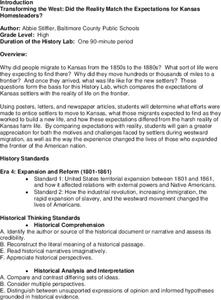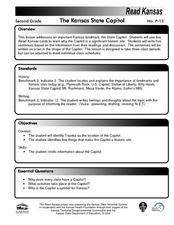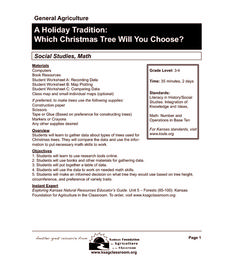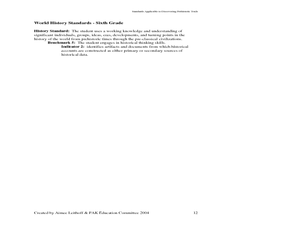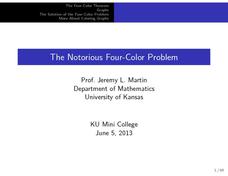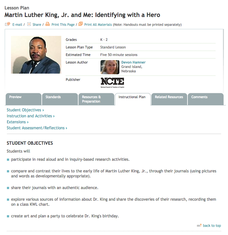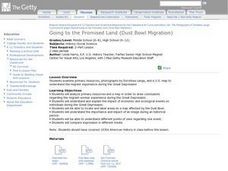Center for History Education
Transforming the West: Did the Reality Match the Expectations for Kansas Homesteaders?
They expected good soil and hearty crops ... but they found buffalo chips and grasshopper plagues. Using an advertisement encouraging famers to go west, budding historians examine primary sources including letters, photographs, and...
NET Foundation for Television
1850-1874 The Kansas-Nebraska Act
How the Kansas-Nebraska Act created Bleeding Kansas is complicated—until scholars research and examine documents from the time. After completing activities that include mapping, photo, document analysis, and discussion, learners...
Curated OER
Sectionalism and the Kansas-Nebraska Act
Students define and discuss sectionalism and popular sovereignty, analyze impact of popular sovereignty in creation of state of Kansas, compare issues in territorial Kansas to current politically divisive topic, and evaluate primary...
Smithsonian Institution
Black Diamond
Score a home run with this packet of information on the very first player of the Negro League to be elected into the National Baseball Hall of Fame — cultural groundbreaker and sports legend Satchel Paige. These worksheets include a...
Curated OER
The Kansas State Capitol
Second graders research the Kansas state capitol building. In this historical landmark lesson, 2nd graders explore the Kansas state capitol. Over three days students explore the Governor's office, Senate and House of Representatives, and...
Curated OER
Sectionalism and the Kansas-Nebraska Act
Students use their knowledge of Kansas history to support their position in support of or against slavery in Kansas.
Curated OER
The Role of the Media
Students participate in class discussion to investigate how media affects the ideas of Americans (specifically in politics) and then research events in political history to analyze how the media may have influenced the government's...
NET Foundation for Television
1850-1874 Native Americans and Settlers
Did Western settlers receiving free land from the Homestead Act realize it wasn't really free at all? Scholars investigate the impact Western expansion had on Native American culture in the mid-1800s. They use documents, timelines, and...
NET Foundation for Television
1850-1874 Homestead Act Signed: Who were the Settlers?
Life in the great, wide-open spaces of the West! Scholars analyze the reasons behind the vast movement to the Great Plains after the passing of the Kansas-Nebraska Act and the Homestead Act. Using photographic, document, map, video, and...
NET Foundation for Television
1850-1874 Railroads and Settlement
Have you ever wondered how your town was placed where it is? Scholars research the impact the advancement of the railroad due to the passage of the Kansas-Nebraska Act had on the formation of civilization in the Great Plains. Map...
NET Foundation for Television
1850-1874 Notable Nebraskan: J. Sterling Morton
What are the characteristics of an outstanding citizen? Nebraskan J. Sterling Morton contributed to the formation of societal and family values in his state. Learners gather information on Morton's life accomplishments from primary...
Agriculture in the Classroom
A Holiday Tradition: Which Christmas Tree Will You Choose?
Different varieties of Christmas trees provide an interesting way to combine social studies, science, math, and technology. Class members not only research the history of the Christmas tree holiday tradition, they compare and contrast...
Curated OER
Discovering Prehistoric Trails
Eighth graders examine prehistoric terrain. In this geography lesson, 8th graders discover necessary resources for settlers. Students work in small groups to create a trail crossing the state of Kansas.
Curated OER
The Notorious Four-Color Problem
Take a walk through time, 1852 to 2005, following the mathematical history, development, and solution of the Four-Color Theorem. Learners take on the role of cartographers to study a United States map that is to be colored. One rule: no...
NET Foundation for Television
1850-1874 Homestead Act Signed: The Challenges of The Plains
Start a whole new life in a land known as the Wild Wild West! Learners analyze maps, personal accounts, the Kansas-Nebraska Act, songs, and video clips to uncover life under the Homestead Act. Using their new skills, class members role...
Curated OER
About Life: The Photographs of Dorothea Lange Going to the Promised Land
To better understand the migrant experience during the Great Depression, pupils analyze two primary resources: photographs by Dorothea Lange and a U.S. Map that shows the Dust Bowl. They compare and contrast Lange's images to Steinbeck's...
ReadWriteThink
Martin Luther King, Jr. and Me: Identifying with a Hero
Here, young historians compare their early lives to that of Dr. Martin Luther King Jr.'s. They listen to a read aloud of a story by Dr. King's sister, and then write in the provided reflective journal template. Lastly, they share their...
Curated OER
Popular Sovereignty and the Lecompton Constitution
Young scholars review the Kansas-Nebraska Act and the development of the Kansas territory Constitution. They complete a cause and effect worksheet and discuss the history of the Lecompton Constitution.
State Bar of Texas
Brown v. Board of Education
You walk each day over 20 blocks to school as a 9-year old because the color of your skin does not allow you to attend a school in your own neighborhood. Scholars use the 1954 Supreme Court case Brown v. Board of Education to investigate...
Curated OER
"Medieval Travels, The Mongols and the Silk Road Across Asia"
Eleventh graders are able to take information obtained from the various readings of primary and secondary sources and classroom discussions directed by the instructor and relate it to the student's curretn real life experiences. They...
Alabama Department of Archives and History
"Scottsboro Boys": A Trial Which Defined an Age
Here's a must-have resource. Whether your focus is racism, the Great Depression, the "Scottsboro Boys" trial, or part of a reading of To Kill A Mockingbird, the information contained in the seven-page packet will save hours of research...
Curated OER
Japanese Festivals and Holidays
Bring the excitement and beauty of Japanese festivals into your classroom. Kids with special needs create calendars that reflect special festivals and holidays common to Japanese culture. They start the project by creating a list of...
Curated OER
Darwinist Dogma?
Students debate whether teachers should be mandated to present theories challenging evolution in their classrooms. For homework, they write letters to their local school board expressing their own opinions.
Curated OER
Going to the Promised Land
Students analyze primary resources and map in order to draw conclusions regarding the migrant-worker experience during the Great Depression. They explain and explain the impact of economic and ecological events on individuals.


